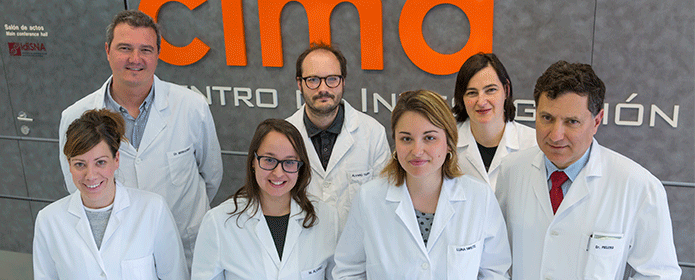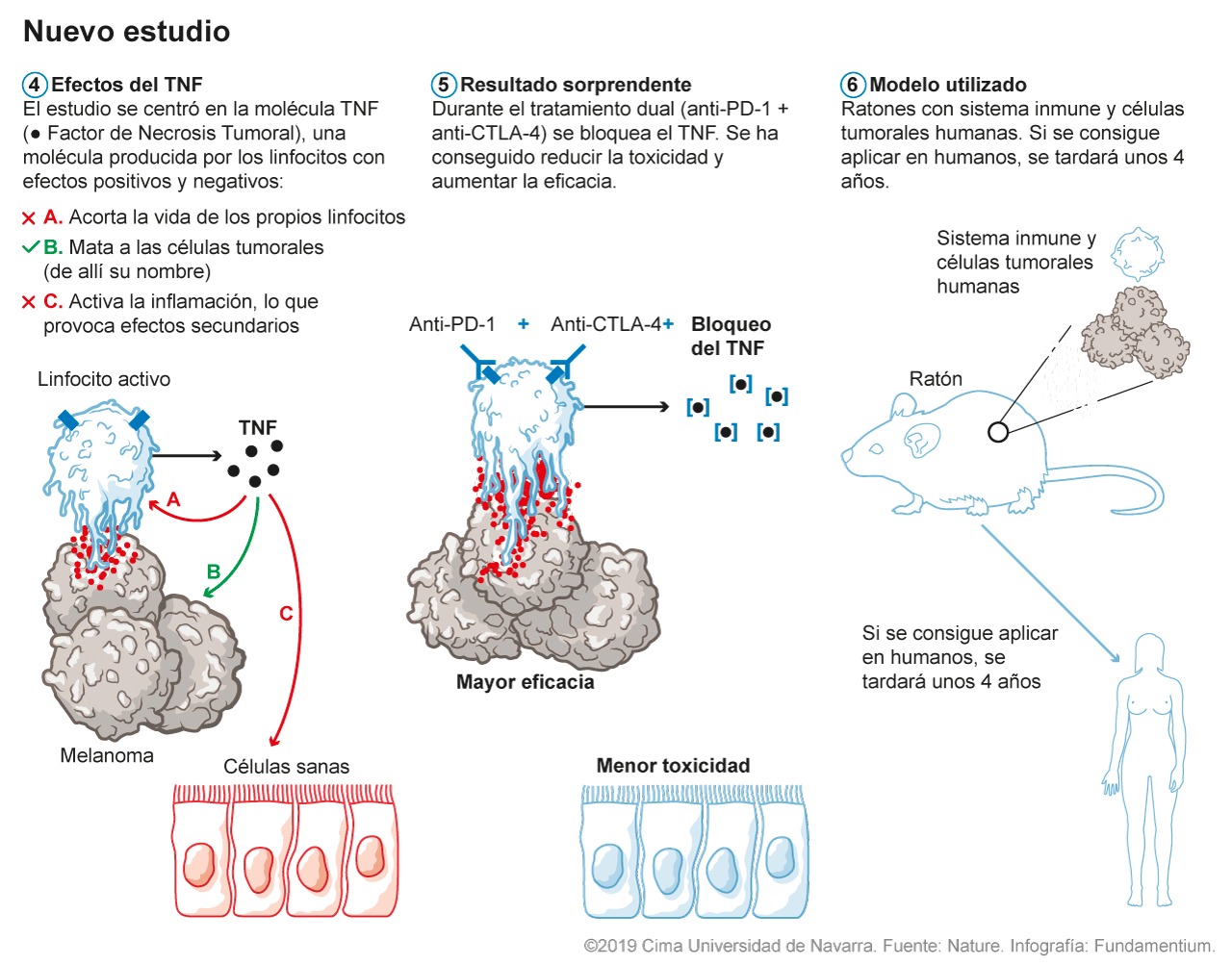New, more effective and less toxic cancer treatment discovered in mice
An experimental study, published in Nature and led by Cima and Clínica Universidad de Navarra, shows that blocking the TNF protein enhances the antitumor efficacy of a cancer immunotherapy treatment.

A study led by researchers from the Cima and the Clínica Universidad de Navarra demonstrates in mice that, by blocking the protein called tumor necrosis factor (TNF) during a potent immunotherapy treatment against cancer (therapy that combines two drugs: anti-PD-1 and anti-CTLA-4), it is possible to improve its effectiveness and reduce toxicity. The research is published in the latest issue of the journal Naturethe leading international weekly science journal.
"In this study we have identified that the immunoregulatory function of TNF is dispensable and, to some extent, impairs the antitumor activity of this dual immunotherapy," explains Dr. Ignacio Melero, researcher senior at Cima and co-director of department Immunology at Clínica Universidad de Navarra. "We have proven in mice that prophylactic TNF blockade during immunotherapy avoids adverse effects and improves their response to treatment. This allows us to better adjust medication doses and thus achieve more robust antitumor efficacy," adds Dr. Pedro Berraondo, researcher of Cima. Dr. Elisabeth Pérez Ruiz, of the Hospital Costa de Sol and first author of work, highlights the usefulness of this approach "since it means using in the context of prevention what we already use in the usual internship treatment of stubborn autoimmune adverse effects".
The next step, say the experts, is to transfer this research to the clinic. According to Dr. Melero, "if the data in patients prove to be analogous, it will change an important paradigm in the therapeutic approach to cancer. However, despite the promise of these results, we must remain very cautious about their interpretation, since these are observations in animal models that we will not know with certainty whether they will be reproduced in the patients included in the clinical trials currently under way or in those that will be initiated soon".
Novelty in anti-TNF treatmentThe research in cancer treatment seeks to extend the benefits of immunotherapy to a wider issue of patients. The latest advances in this field consist of combining several of these treatments. Among them, "the combination of PD-1 and CTLA-4 inhibitor drugs achieves extraordinary efficacy against the most aggressive skin cancer (melanoma), kidney cancer and lung cancer. However, 40% of patients suffer serious side effects," Dr. Melero points out.
PD-1 and CTLA-4 are proteins found in subject of immune cells, the T lymphocytes, and their mission statement is to prevent these cells from destroying other cells, such as cancer cells, thus acting as "brakes" in the control of the immune system. By inhibiting these molecules, the action of these "brakes" is eliminated and the body's defense action is stimulated. Dr. Melero recalls that "this dual immunotherapy has clearly demonstrated its efficacy in patients with metastases in melanoma or renal cancer. It is currently being tested with very promising results in other types of cancer. However, treatment must be interrupted in more than a third of cases due to adverse autoimmune effects, which is why it is so important to prevent these side effects in the way that our study provides".
Tumor necrosis factor (TNF) serves to mediate inflammation, induce the destruction of some tumor cells and activate white blood cells, the cells of the immune system. Blocking this protein in immunotherapy is not new, but its prophylactic application in this anti-PD-1 and anti-CTLA-4 therapy is. "The evidence in patients is scarce but points to excellent safety of TNF inhibition in patients with advanced cancer," Dr. Berraondo points out. "Our results at laboratory together with previous clinical experience suggest clinical trials to test the safety and efficacy of the treatment." In fact, notes Dr. Melero, "we are evaluating a possible protocol of essay clinical to study the effect of prophylactic TNF blockade on treatment with nivolumab (anti-PD-1) and ipilimumab (anti-CTLA-4) in humans."
This research has been financed by the network International Immuno-Oncology, (a global peer-to-peer partnership formed by Bristol-Myers Squibb), the association Española Contra el Cáncer, various European funds and other grants such as that of "la Caixa". In addition to Cima and the Clinic, researchers from research center Biomedica en network de Cáncer (CIBERONC), the Hospital General Universitario Gregorio Marañón, the Hospital Costa del Sol, the Hospital Universitario Virgen de la Victoria, the high school de research Sanitaria de Navarra (IDISNA), the high school de research Biomédica de Málaga (IBIMA), the Centro de Investigaciones Médico-Sanitarias (CIMES) and the University of Málaga have participated in the project.
-
reference letter bibliographic
Prophylactic TNF blockade uncouples efficacy and toxicity in dual CTLA-4 and PD-1 inmunotherapy
DOI: 10.1038/s41586-019-1162-y


